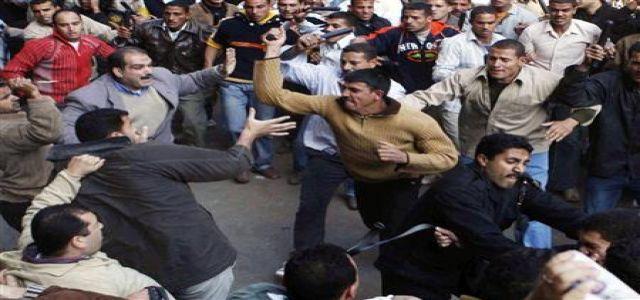- December 14, 2005
- 4 minutes read
Fed-up Egyptians boost Brotherhood

Fed-up Egyptians boost Brotherhood
Islamists win 20% of parliamentary seats `They understand our problems,’ voter says
—Mohammad El-Sabbagh wanted nothing to do with the violent clashes that erupted between police and the general public on the final day of parliamentary elections in Egypt last Wednesday.
Ambulance sirens were sounding off as police fired tear gas and rubber bullets at supporters of the banned opposition group, the Muslim Brotherhood. Protestors threw stones and set tires ablaze near police lines in retaliation.
El-Sabbagh had closed down the Internet café he operates northeast of Cairo and was watching the rioting from a safe distance. But when he overheard that a foreign reporter was looking for a place to file his story, he volunteered to reopen his shop.
“Let the world know how our government is treating us,” said the 38-year-old physical education instructor who runs the café as a side business.
“I am not a member of the Muslim Brotherhood but I sympathize with them and I want them to win because they understand our problems and can help us.”
In a historic turn of events, the Brotherhood had won almost 20 per cent of the parliamentary seats in what was billed as a test of Egyptian President Hosni Mubarak’s pleas for democratic reform.
Twenty per cent is a long way from a majority, but official numbers tell half the story. Mubarak’s ruling National Democratic Party, an ally of the United States, may have garnered a two-thirds majority — but less than 50 per cent of the 444 candidates fielded by the ruling party had won.
Top figures in the party, including a former deputy prime minister lost. The two-thirds majority needed to grant the president a free hand in decision making was secured only after bringing 100 independent winners into party ranks following the announcement of results. In contrast, close to 60 per cent of the Brotherhood’s original slate of 150 candidates were elected.
For thousands of Egyptians, choosing the Muslim Brotherhood may have been influenced by the group’s religious ideology, but for thousands of others, it was their way out of the current status quo.
Saad El-Deen Ibrahim, director of the Ibn Khaldun Centre for Development Studies, said the ruling party’s 25-year-old policy of weakening civil organizations and clamping down on opposition movements seeking change had helped the rise of Brotherhood.
“Mubarak could not close down the mosques of Egypt to prevent the Brotherhood from communicating with its base,” the analyst wrote in Egypt’s weekly Al-Ghad newspaper.
“They augmented their proselytizing by establishing a comprehensive network of social and productive services that provided employment opportunities for their cadres and addressed the basic needs of poor Muslims,” he said.
Unlike the mullahs of Iran or the Wahhabi rulers of Saudi Arabia, the majority of Brotherhood candidates donned Western-style suits. Many are middle-class physicians, engineers or industry workers who have been active in their communities for years.
For El-Sabbagh, the Brotherhood remains the best alternative among Islamist groups.
“They don’t believe that music is a sin or in forcing women to cover their faces like the Taliban do,” he said, adding that if anyone is to blame for their success it is the current regime in power.
“The government normalizes their relations with the United States, they normalize relations with Israel, but they have yet to normalize relations with their own people.”



